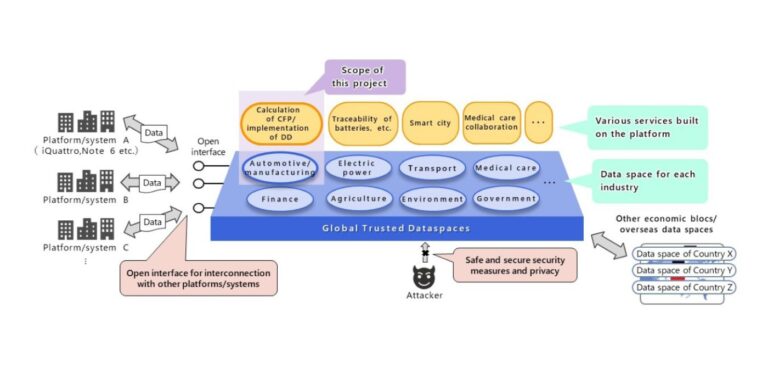Japanese firms Denso and NTT Data Corporation have started to build an industry-wide ecosystem for electric vehicle (EV) batteries, intended to create a global trusted dataspace where data necessary for emissions calculations and other tasks can be shared, while at the same time protecting private data.
The companies note that battery regulations currently being reviewed in Europe will require the disclosure of CO2 emissions and the resource recycling rates throughout battery lifecycles to the European Commission. In the future, when Japanese companies sell EVs, including BEVs and hybrid electric vehicles, in to the European market, they will be required to meet these regulations. To make this possible, they deem it necessary to build a common platform for securely sharing data between suppliers in the value chain, instead of requiring respective companies to meet the regulations individually.
In the future, it is envisaged the platform used for the ecosystem will serve as a next-generation information infrastructure, allowing for the secure use of data among companies in different industries, including EV batteries. The companies have launched a study into the development of a common platform for the automotive and manufacturing industries, with the aim of commercializing services by the end of 2023.
To prevent differences in business practices and legal regulations in respective countries and regions from hampering data distribution, the companies are studying data-sharing platforms in various countries in collaboration with a variety of other companies and organizations. Examples include building mechanisms such as Gaia-X, which is a common standard for data distribution platforms in Europe, and Catena-X, which is led by German auto makers and IT companies.
It is expected that Japanese companies that do business with German automotive companies will be required to distribute data via Catena-X. If they do so in accordance with the battery regulation in Europe, data related to trade secrets, such as information on the raw materials of automotive components and order taking and placement, in addition to the carbon footprint (“CFP”) information, will be stored in data centers located overseas. This may raise concerns for Japanese companies from the viewpoint of information management. Thus, Japan needs a unique system which can be interconnected with data spaces in Europe while safely ensuring data management based on Japan’s policy.
The two companies say they will study a method for calculating the CFP information of their supply chains. NTT Data has worked with Nippon Telegraph and Telephone Corporation (“NTT”) and NTT Communications Corporation (“NTT Com”) to build the platform and create the Japanese data space, which is connected to platforms for safely exchanging data between companies.
Denso has been developing traceability technology for safely managing information of individual parts and products on data platforms by utilizing the QR Code, which was developed in-house, and blockchain technology, which is used in all industries, and connecting physical ‘things’, including in-vehicle batteries, with ‘data’ on battery life and raw materials accompanying individual parts and products.


